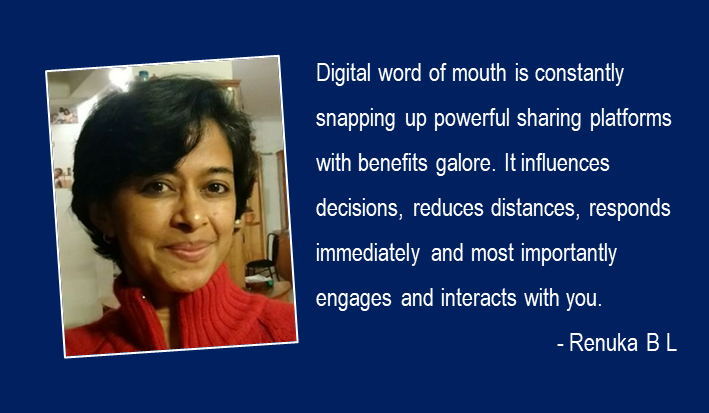Why do some stories get contagious and rumours get more infectious than others?
A great vacation destination, a good movie, a discount deal, a book, an exciting recipe, a senior’s action or a layoff gossip at work, we simply love to share. Whether it is to entertain friends, build professional relationships, achieve business benefits or bond emotionally, we want to share with those around us.
Friends, they tend to influence us more because they tell it straight or rather, we understand their objectivity and candidness. Simply put, we trust them! (Obviously, a friend will not rant about diapers, knowing, there isn’t a baby at the other end). Therefore personal connections and trust form the bedrock in creating influence.
Digital word of mouth is constantly snapping up powerful sharing platforms with benefits galore. It influences decisions, reduces distances, responds immediately and most importantly engages and interacts with you. It creates and establishes personal connections and circles back to our need to share and re- share.
Simply asking, why do some stories get contagious and rumours get more infectious than others?
We develop a relationship with the influencers we follow, we start placing our trust in them. Therefore, any recommendation or an endorsement from them is viewed as more trustworthy in comparison.
During my early PR (Public Relations) career days, I learnt from my journalist friends that “Press releases and corporate announcements” need to be factual, i.e. supported by solid facts. The facts are endorsed by spokespeople, who will own the responsibility for the veracity of the message. A coordinator takes charge of effective formulation and dissemination of the message, followed by effective results. Follow up stories, always circled back to the preceding announcements and forecasts, wherein leaders justified the outcome with most reliable facts.”
Ethos of trust and ethics
- Visionaries like the TATAs, exemplify leadership with trust and ethics. The impressive series #Tata stories curated by Harish Bhat, is one great influencer. Great stories are indeed universal.
- Thought leaders drive ideas and turn them into reality and guide us through success. We trust them!
- Mentors help us define ourselves. We trust them!
- Formal pedagogy enhances learning experience and improves clarity. It helps build trust!
Like the saying goes, “In any relationship, the essence of trust is not in its bind, but in its bond”.
 The science behind sharing
The science behind sharing
According to Austrian psychologist, Ernest Dichter, there is a psychology of sharing and science of social transmission. He outlines four reasons that motivate people to share and there are several other theories that reiterate them
-
- Reason one- I share because, it gets me involved in the product ( a great vacation, so pleasurable), that, I have to share
- Reason two – Perhaps, it makes me feel special, self-involvement (knowledge about the vacation spot ), that can gain me more attention, hence I should share
- Reason three- I share because, I want to help others– Other involvement
- Reason four- Message Involvement – The message is so valuable and worthy that I have to share.
Virility is not born, but made- let’s infuse the ethos of trust in all that we say and post.
We can perhaps beat the pandemic called #Social Dilemma.
The views and opinions published here belong to the author and do not necessarily reflect the views and opinions of the publisher.



Be the first to comment on "Word of mouth and social influence"